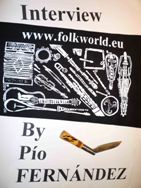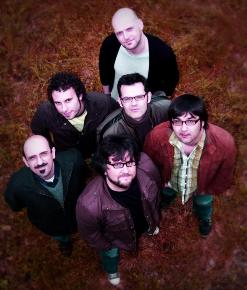
Full interview
 Full interview |

OPHIUSA
A New Evolution for Galician Folk Music
Among all the Autonomous Communities of Spain, Galicia is probably the one that takes the lead with respect to the popularity and the relevance of traditional and folk music. This explains why there are so many innovative musical projects coming from there. The band from Santiago de Compostela, OPHIUSA, has released its second CD, ‘Sen Planeta’, which shows how Galician folk music can evolve to new styles open to influences of all kinds. OPHIUSA was in Madrid in June, and FolkWorld had the chance to get their interesting opinions and future plans.
Geography & History
Galicia is the Northwest corner of the Iberian peninsula, just to the North of Portugal, the country which shares the origins of its language. Ophiusa is the name that the ancient Greek colonists gave to today’s Galicia & the Northern part of Portugal. This place name is related with the word ‘ophidian’, ‘snake’, either due to the abundance of these reptiles in the area, or even for the religious worship given to these animals by the primitive local inhabitants.
But let’s not be mistaken by thinking that OPHIUSA is a new Galician folk band whose music is developed seeking any special affinity with the Portuguese rhythms or the ‘Celtic’ sounds.
 Ophiusa @ FolkWorld: FW#42, #43 |
The Band
In June 2010 we had the chance to meet Paulo GACIO (OPHIUSA’s traverse flute, soprano sax, programmed loops) and Carlos MONTILLA (director from the cultural services agency NONSI) in Spain’s capital Madrid. We chatted for a while stopping for drinks and tapas in three cool places in downtown Madrid : the Irish pub MOORE’s (near Plaza Mayor), the Galician tavern MACEIRA and La Taberna de Elisa (near Huertas street). We could get to know interesting opinions about the new Galician folk and the latest music from OPHIUSA, reflected in their second CD, ‘Sen Planeta’.
Besides Paulo GACIO, the other members of OPHIUSA are :
The original band started in Santiago de Compostela in 1986. Although they began with a very traditional Galician music basis, the common taste for more modern sounds favoured the incorporation of new elements such as the electric bass guitar and the drum set, seeking a new and differentiating style for OPHIUSA. The final evolution to their sound in 2010 has progressively taken place along the last decade.
Influences on Modern Galician Folk
When we asked Paulo GACIO about their references in today’s Galician folk music, the band BERROGÜETTO is one of the first to be named, although they also recognize early influences from ‘classics’ such as MILLADOIRO. But it is funny that after listening to ‘Sen Planeta’ for some minutes, my memory brought the image of the Scottish band SHOOGLENIFTY. And sure enough, before I could even mention it, Paulo admitted the sextet from Edinburgh as their clearest model. Donal LUNNY is another proudly admitted source of inspiration, quite understandable, considering that the string instruments (bouzouki, mandola, guitar, bass guitar) are in the basements of OPHIUSAS’s latest sound.
There are two big areas of Europe that have been adopted as strongly influential by the musicians in Galicia, since at least the folk revival of the late 1960s and 70s :
Nevertheless, Paulo was very sincere when unveiling the much broader spectrum of foreign musicians that have illuminated the recent paths for Galician bands such as BERROGÜETTO, ANUBIA and also OPHIUSA. We are talking for example about Swedish and Finnish artists such as VÄSEN, HEDNINGARNA, GARMARNA, VÄRTTINÄ, ... But there are also bands from Eastern Europe and the Balkans: FANFARE CIOCÂRLIA, TARAF DE HAÏDOUKS, Goran BREGOVIC, Klezmer music bands, ...

Music, Politics, Business
We talked for a while with Paulo and Carlos about the practically ‘zero’ attention that the Madrid politicians administering our yearly taxes are paying to the traditional and folk music in this city. But then I was quite surprised to hear that, from their point of view, in Galicia things were not really that much better. I was not really sure if I could completely share such negative view. But they provided a few examples of great Galician folk artists that - even though they were significantly contributing to the touristic projection of Galicia with their music - were getting practically no compensation that would help them to go on tour, not even throughout Spain.
Successive local Galician governments (right and left wing) have made some visible efforts to support a few local trad and folk music activities, also for touristic promotional purposes. But it is true that there is a lot more potential waiting to be sponsored in the many artists that are still trying to move ahead with their own projects, their limited personal resources, but their endless enthusiasm. And of course the initiative and the imagination could not only come from the public institutions.
In these regards, for sure Ireland can be a very valid model. Just taking a look to the global network of pubs that Irish beer brewers have established in all corners of the planet, and that have become the best embassies for their traditional music. I am still waiting to see some Galician winery, Asturian cider brewer or Andalusian sherry maker to establish a minimum infrastructure of taverns capable to promote Spanish musical traditions.
OPHIUSA’s Innovation & Return to the Roots
The band has released two CDs already :
Regarding OPHIUSA’s plans for future recordings, Paulo GACIO mentions their intention “to go back to the roots”. To work on a CD mostly based on traditional Galician songs, just incorporating a few of the innovations that they have extensively developed in their two previous recordings.
Paulo GACIO is also a music teacher and a journalist in the radio station RADIO OBRADOIRO from Santiago de Compostela, with the program ‘En Clave de Folk’, where he has done a great job in the promotion of new artists for the Galician folk planet such as QUEMPALLOU, XOXIMILCA, BELLÓN and MACEIRAS, … and now also bands from Catalonia, Madrid, Basque land such as KEYMPA or NEMO.

Photo Credits:
(1)-(2) Ophiusa (press photos).
|
To the German FolkWorld |
© The Mollis - Editors of FolkWorld; Published 11/2010
All material published in FolkWorld is © The Author via FolkWorld. Storage for private use is allowed and welcome. Reviews and extracts of up to 200 words may be freely quoted and reproduced, if source and author are acknowledged. For any other reproduction please ask the Editors for permission. Although any external links from FolkWorld are chosen with greatest care, FolkWorld and its editors do not take any responsibility for the content of the linked external websites.
